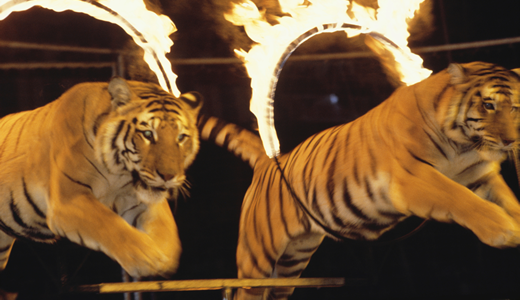Sometimes cultural change claims unexpected victims.
Last week, it came for an icon birthed in a bygone era: the Ringling Brothers and Barnum & Bailey Circus. The production, known for generations by its tagline “The Greatest Show on Earth,” will perform for the last time in May. That will mark the end of a 146-year run that began, as AP’s Tamara Lush noted, “before automobiles or airplanes or movies, when Ulysses S. Grant was president and minstrel shows were popular entertainment.”
On the most basic level, the reason is purely economic: rising costs and declining revenues. The cost of transporting the production’s animals, performers and infrastructure by rail has increased. Meanwhile, fewer and fewer people have packed the kids into the car to go see the circus.
But dig a bit deeper, and we see other cultural and technological changes as well.
Animal rights activists took aim at the circus’ use of elephants in its performances. They waged an influential PR campaign, and a costly legal one that prompted the circus to pack in its performing pachyderms last year. Despite allegations of animal abuse, though, plenty of people apparently still wanted to see those enormous animals perform, because ticket sales dropped once the elephants were retired.
But the circus also fell victim at least in part to the explosion of media and entertainment options available in the digital age. In the new millennium, “The Greatest Show on Earth” was, ultimately, just another show—one competing with all the other entertainment that’s available for less money, and at the push of a button.
Last year, circus producer Alana Feld talked about how the circus was still at that point trying to streamline its production in order to cater to the times. “It used to be so many acts and performances happening at once, now there’s a lot more focus,” she told digitaltrends.com last July. “The show is also a lot faster paced, because kids today don’t have the attention span maybe I did as a child or before that.”
Alas, it was too little, too late.
“[The circus] been through world wars, and it’s been through every kind of economic cycle and it’s been through a lot of change,” said Kenneth Feld, chairman and CEO of Feld Entertainment, which owns the circus. “In the past decade there’s been more change in the world than in the 50 or 75 years prior to that. And I think it isn’t relevant to people in the same way.”
The thought of a world without the Barnum & Bailey circus makes me surprisingly wistful. It feels as if we’ve lost something that’s somehow culturally significant, an old institution dying on our watch.
And yet …
I’m pretty sure I haven’t been to the circus since I was a kid in the 1970s. And every time I would see the circus’s logoed train roll through our town now as an adult, I would think, We should take the kids to the circus someday.
But I never followed through on that nostalgic impulse. And now, I never will.
Is it the end of the world that my kids will likely never see a real, live circus? No, it’s not. But it feels like the loss of something simpler and more innocent from another age nonetheless, another link to our shared cultural heritage severed.
And for that reason, I’ll momentarily mourn the loss of The Greatest Show on Earth.






Recent Comments